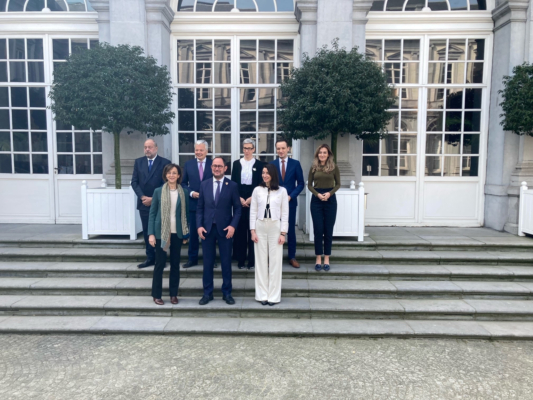 Credit: MJUST
Credit: MJUST
On Monday 28 March 2022, the Belgian Minister of Justice, Vincent Van Quickenborne, hosted the ninth meeting of the so-called "Vendôme Group", in which the French, German, Dutch, Italian, Spanish and Luxembourg Ministers of Justice participated, along with the European Union (EU) Commissioner for Justice, Didier Reynders.
The first meeting of the Vendôme Group on 7 November 2018 took place in the aftermath of the terrorist attacks in Paris, Brussels and Berlin, while the present meeting takes place against the backdrop of the war in Ukraine. The ministers remain appalled by the continuing military attack and aggression by Russia against a free and sovereign state and its civilians. The ministers reiterated their condemnation in the strongest terms possible of the ongoing aggression and in particular of the indiscriminate use of violence against civilians. They emphasised that perpetrators of war crimes and other serious violations of international law will be held accountable.
The ministers had an exchange of views on the importance of accountability through ongoing investigations and on ways to cooperate and gather evidence for current and future investigations, both on a national level and by the International Criminal Court (ICC). They recalled the important support that could be provided by Eurojust in an effective coordination of investigations, between Member States of the EU, Ukraine and the office of the Prosecutor to the ICC. They also agreed to further coordinate their approach in order to ensure that information is given to refugees on the possibility to give evidence of possible war crimes in a legally safe way, avoiding double victimisation. Taking into account the origins of the Vendôme group, the ministers also addressed the prosecution of Foreign Terrorist Fighters.
They further explored ways in which the enforcement of European sanctions against Russia and Belarus could be reinforced. The ministers welcomed the creation of the "Freeze and Seize" Taskorce which was set up by the European Commission and which is convened under the responsibility of Commissioner Reynders. They recognised the added value of further coordinating among Member States with regards to the immobilisation and, where appropriate, seizure and confiscation of assets of those who facilitate the war in Ukraine. They insisted on the importance of an operational approach, taking full advantage of the competence of Europol and Eurojust, in order to collect information and evidence of possible criminal offences allowing seizure and confiscation.
The ministers of Justice further discussed the issue of Europeans joining the Ukrainian foreign legion. Ministers univocally discourage Europeans to join the fight on the battleground. The ministers agreed to continue the dialogue and coordination.
Furthermore, the Vendôme Group discussed ways to strengthen the rights of victims, and expressed their support to the EU Commission in further exploring ways to reinforce the 2012 Directive establishing minimum standards on the rights, support and protection of victims of crime. Taking into consideration the number of good practices which have been developed nationally the Vendôme Group suggested a more systematic exchange. More specifically, they focused on ways to prevent Ukrainian refugees, who find themselves in a very vulnerable position, falling victim to abuse or exploitation.
Finally, the ministers focused on challenges of the criminal justice systems in the digital age. Big data opens many possibilities for high profile investigations. Therefore it is important to consider how and to what extent access to big data by law enforcement services can be provided. The Vendôme Group discussed the role of data retention and whether it is essential to preserve national security and to fight serious criminal offences. Furthermore, the ministers reiterated the importance of increasing the efficiency and resilience of the justice system through enhanced digitalisation, while recognising the fundamental importance of human oversight.









